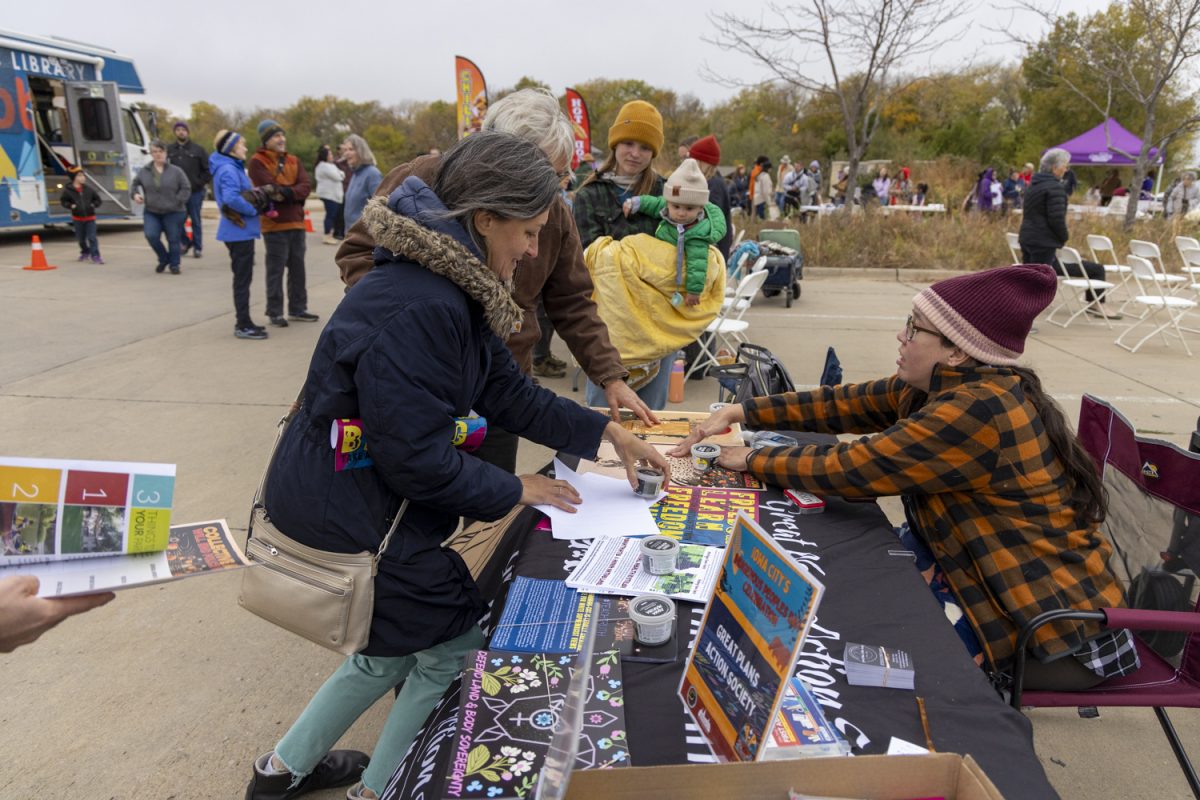Iowa City residents gathered at Terry Trueblood Recreation Area Monday afternoon to celebrate Indigenous Peoples’ Day with a series of events honoring Native American presence, history, and culture.
This year’s event marked the second annual celebration, co-hosted by the Indigenous-led nonprofit Great Plains Action Society, the Indigenous-owned jewelry store The House of Dotl’izhi, and the Iowa City Office of Equity and Human Rights.
Alicia Velasquez, an Apache and Yaqui owner of The House of Dotl’izhi, said the holiday and event are vital for celebrating Indigenous culture and educating the community. She emphasized the need for a broader understanding of the ongoing efforts, dating back to the late 1970s, to rename Columbus Day to Indigenous Peoples’ Day.
“It’s a joyful day, and a day to celebrate for us because we are finally being heard,” Velasquez said. “It’s finally being recognized that Columbus didn’t discover anything.”
A growing movement rejects the idea that Christopher Columbus “discovered” America, emphasizing the need to recognize Indigenous peoples’ long-standing presence and the harm caused by colonization.
In October 2018, Iowa Gov. Kim Reynolds signed a proclamation officially renaming Columbus Day to Indigenous Peoples’ Day across the state. President Joe Biden became the first U.S. president to issue a proclamation recognizing Indigenous Peoples’ Day in 2021, though it has not yet been made a federal holiday.
Representation Director from Great Plains Action Society Jessica Engelking, a descendant of White Earth Band of Ojibwe, took the stage shortly after the event started at 4:30 p.m. to highlight the work of the Iowa City-based organization.
Engelking explained that the Great Plains Action Society has the following main areas of focus: protecting land and water, Indigenous representation, civic engagement, and the ongoing crisis of missing and murdered Indigenous people.
“To be able to be part of an organization that works to address, heal, and stop the trauma caused by ongoing colonization is the most important work I can be a part of,” Engelking said.
As part of the organization’s civic engagement efforts, Engelking acknowledged the League of Women Voters of Johnson County, which had set up a table at the event for voter registration. She emphasized the importance of Indigenous participation in voting, given the long history of disenfranchisement faced by Native communities.
Native Americans were granted U.S. citizenship in 1924 but faced state-level voting restrictions until 1962, making them the last group in America to secure full voting rights.
“We’re going into spaces we’ve historically been excluded from and making sure we have a voice to speak for the people and the land,” Engelking said.
She also encouraged attendees to vote down the ballot, noting the importance of smaller elections such as city council and school board.
In recent months, Great Plains Action Society has attended Indianola School Board meetings and spoken out on social media, urging the district to change its nickname, the Indianola Indians, and to stop using Native imagery on school property and apparel.
RELATED: Latino and Native American Alumni Alliance and Cultural Center celebrate 50 years
“It’s well past time to retire these mascots,” Engelking said at Monday’s event. “They’re harmful for children.”
Despite the organization’s pushback, the Indianola Community School District voted to keep the district’s “Indians” nickname and dreamcatcher imagery at its Sept. 9 meeting.
“It’s disheartening to have to keep fighting the same fight,” Engelking said, referencing the long history of racist mascots targeting Indigenous people in the U.S. “But when things harm people, especially children, we’re going to keep fighting.”
Mack Rankin, president of Indianola Community School District School Board, declined The Daily Iowan’s request for comment.
After Engelking’s remarks, the Eagle Feather Drum group performed several songs, while dancers Ashley Davenport and Doug Thomas took turns performing in full regalia.
The UI Native American Student Association also had a table at the event, following a decolonization rally they hosted earlier in the day on the Pentacrest.
Joe Maxwell, a first-year master’s planning student and member of the Wampanoag Tribe of Gay Head Aquinnah, became president of the Native American Student Association after the previous president graduated in May.
“It’s been a really rewarding experience so far,” Maxwell said. “We have a great team where everyone brings ideas to the table.”
He said Monday’s events serve as a powerful reminder and celebration of Indigenous resilience.
“I think it’s really important to have events like these to acknowledge that Indigenous people, despite some of the worst erasure activities that we’ve seen on this planet, are still here today,” Maxwell said.



